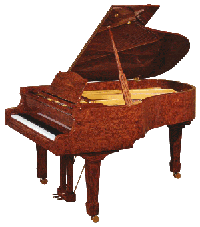Need A Piano Tuner? Who ‘ya gonna call? Be sure to use a qualified technician to service your piano. A Registered Piano Technician (RPT) is a good choice. The Guild certifies technicians who have passed a series of exams to become Registered Piano Technicians. You can find Registered Piano Technicians at www.ptg.org, listed by zip code in your area. Associate Members are also allowed Guild membership, but have not yet passed the tests. Hiring a Registered Piano Technician (RPT) is the best way to insure that you are hiring a competent technician.
Posts Tagged ‘new piano’
What is a Registered Piano Technician?
Tuesday, June 29th, 2010Warrantee Service
Tuesday, June 29th, 2010New Piano Defects: If you have any problems with your piano, and it is under warranty, be sure to let the technician know before any work is done. How Warrantees Work: Most manufacturers require authorization for warranty repairs before the work is performed. Don’t get stuck paying for a repair that is covered by the warranty. What is Covered? Some types of repair are not covered, and are classified as normal wear and tear. Tuning, voicing and regulation are not normally covered, unless there is a chronic problem that was apparent when the piano was purchased, or that is deemed a manufacturing defect. How to Solve the Problem: Open communication with your dealer is essential to proper handling of any problem that may arise. Your dealer should be the first to know of any defects or problems with your piano. The technician will be interested in getting the piano fixed, and may not be aware of the need to work with the dealer in this regard. Always direct the technician to the dealer before work is done, to be sure the proper repair is performed. Who should do the repair? Often, the technician who works for a dealer of a certain brand that you own, knows the best way to repair problems on that particular brand. Better to let the expert perform the repair, rather than someone who may be “reinventing the wheel”, trying in vain to solve a problem. You get what you paid for: Be aware, also, that a less expensive piano may not have had as careful workmanship as a more expensive one. Don’t expect a “world class” piano at a bargain -basement price.
Piano Moving
Tuesday, June 29th, 2010- Moving Companies: If you ever move a piano, don’t rely upon household moving companies to move the piano. Piano moving is an art unto itself. Piano movers are specialists, and are equipped with special dollies and tools to move pianos.
- Damage: When it’s too late, and your piano is damaged by a moving company, you will find yourself wishing you had gotten better advice.
- Who to Call: I recommend Encore Piano Moving. They have years of experience and will treat your piano with care. Call Jeff Grayson at (858) 271-0388.
Accessories
Tuesday, June 29th, 2010 String Covers: If you have a grand piano, and live near the ocean, I recommend a “string cover”. This cover is installed inside the piano, over the strings. It is made of wool, and absorbs any moisture from the atmosphere. The cover does not touch the strings, so you can still play it without noticing any reduction of sound. Dust is sealed out. I’ve seen many pianos with string covers that look as new inside as they were when the piano was made. Other pianos without covers quickly collect dust and dirt, and lose value and appeal in a year or two. They are available in different colors and are well made and attractive. A highly recommended investment.
String Covers: If you have a grand piano, and live near the ocean, I recommend a “string cover”. This cover is installed inside the piano, over the strings. It is made of wool, and absorbs any moisture from the atmosphere. The cover does not touch the strings, so you can still play it without noticing any reduction of sound. Dust is sealed out. I’ve seen many pianos with string covers that look as new inside as they were when the piano was made. Other pianos without covers quickly collect dust and dirt, and lose value and appeal in a year or two. They are available in different colors and are well made and attractive. A highly recommended investment.
Caster Cups: Caster cups are recommended for wood floors to protect the wood from the steel casters. I carry many types of caster cups, both in wood and plastic, that will match the piano or floor. Adding caster cups will enhance the singing tone of a grand piano if the piano is placed on a concrete floor, even if covered by a carpet.
Dehumidifier System: Seasonal changes in humidity affect the tuning of a piano. Especially if you live near the coast, you need this system. It will stabilize the tuning over a longer time, and also prevent swelling of the wood parts and rusting of the strings. Grand pianos with both a string cover and dehumidifier will protect your piano from damage and keep it in tune longer.
High Gloss Finishes
Tuesday, June 29th, 2010 New Piano Finishes: Most new pianos are made with a polyester high gloss finish. If you have one of these, I can recommend some products to help keep the finish looking like new.
New Piano Finishes: Most new pianos are made with a polyester high gloss finish. If you have one of these, I can recommend some products to help keep the finish looking like new.
What Do I Need? Since the finish is basically a plastic resin, any product that is intended for plastic will work well. I recommend products made by Meguiar’s Mirror Glaze, available from Kragen Auto Stores and other automotive and boat stores. #10, #17 and #18 are good products. You may find other products for plexiglas or lexan, which are suitable also. Gel Gloss, available in drug stores and supermarkets for use in fiberglass shower stalls, is also a possibility.
What to Avoid: What you should NOT USE: Any “Bon Ami”, “Ajax” or other cleanser, Windex, Lemon Oil, Furniture Polish, solvents, cleaning solutions, and other cleaners that leave a residue on the surface.
Cleaning Cloths: Use only 100% cotton cloths to apply and remove excess polish from the surface, like a diaper, terrycloth, flannel or other soft cloth. Synthetic fibers may leave micro scratches on the surface.
Protect the Surface: Be careful not to place any object on the piano without some kind of padding or felt underneath to protect the finish. The high gloss finish is very soft, and will scratch easily. The finish is very durable, but if impacted it will shatter.
Polishing and Repairs: Repair of the polyester finish is possible only by a specialist in this type of repair. I specialize in buffing and repairing polyester finishes.
Piano Cleaning
Tuesday, June 29th, 2010 Cleaning: Cleaning the inside of a piano, especially a grand piano, is not as mysterious as it may seem. Most parts of a piano are rugged, and you need not worry about hurting anything EXCEPT DAMPERS in a grand piano. The dampers are those black things that rest on top of the strings, and that move when you press the damper pedal. Be careful not to snag them with a cleaning rag.
Cleaning: Cleaning the inside of a piano, especially a grand piano, is not as mysterious as it may seem. Most parts of a piano are rugged, and you need not worry about hurting anything EXCEPT DAMPERS in a grand piano. The dampers are those black things that rest on top of the strings, and that move when you press the damper pedal. Be careful not to snag them with a cleaning rag.
Vacuum: To remove excess dust under the strings, use a hair dryer (Heat OFF!) to blow dust into the left corner where you can vacuum it up or pick it up with a dusting cloth. Dust sticking to the board under the strings can be removed with special equipment, and this is best done by your technician. People ask, “Is it better to close up the piano to prevent dust from entering?” My answer is, dust is like air. You can’t avoid it. Up or down doesn’t really matter, it’s up to you.
Keys: Cleaning the keys is best done with some mild cleaner applied with a soft cloth (NEVER SPRAY ANYTHING ON THE KEYS). If your piano has ivory keys, and they are badly soiled, use “Softscrub” or other mild abrasive cleaner. Be sure to dry the keys thoroughly afterwards.
Brass: If the brass hardware on the piano is tarnished, I recommend “Brite Boy” brass cleaner. Note that many brass parts are coated with a plastic or lacquer coating to prevent premature tarnishing. After some time, the brass may become tarnished in tiny spots which grow larger in time. The coating must be first removed before the brass can be cleaned and polished. “Flitz”, a polishing cream, is a good choice for stubborn tarnish, as well as Brasso. If you have a high polish finish, Brasso may leave a dull finish and residue, so avoid Brasso if you have this type of finish .
Spills: Be sure not to allow anything to fall inside of your piano, especially anything wet. If anything spills inside, try to mop it up as soon as possible. Call a technician immediately to have the piano inspected for damage. Time is critical here, and long term damage may be avoided by immediate servicing of the piano. Don’t touch the strings, especially the bass strings, since finger oils will tarnish the strings, .leaving discolored spots on them.




